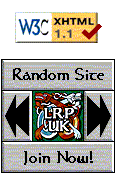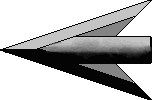
|
Index |
| OOC Info |
| The Unit |
| Archives |
| Links |

|
Out Of Character Information
This section is devoted to attempting to explain what this site is all about. We will hoepfully be able to answer all your questions in these three sections: However, if we do not answer all your queries, please feel free to and we will endeavour to explain what is going on In the Early seventies, a student at an American university was bored, and created a game. He made a few copies for his friends, and sold them on at a small profit. More people kept asking the student for a copy of the game, and so he made more. That American student was E. Gary Gygax (shown on the right), and the game was Dungeons & Dragons.
In the Early seventies, a student at an American university was bored, and created a game. He made a few copies for his friends, and sold them on at a small profit. More people kept asking the student for a copy of the game, and so he made more. That American student was E. Gary Gygax (shown on the right), and the game was Dungeons & Dragons.
Most people out there (yes, we mean you) have heard of Dungeons & Dragons, whether it be from the point of view of an avid player, or the point of view of people who think the whole idea of roleplaying is some Satanic mind control. It may be that you have heard both sides of the argument, and just want to know what everyone's getting so worked up about.
It's all about escapism.
It has nothing to do with consorting with real demons, satanic rites at midnight in the woods, or going on killing sprees. Unless you want to.
I'M KIDDING!! (Though some people would have you believe otherwise...)1
Either way, as time progressed, players got bored of sitting around a table, rolling dice and dropping pizza on their character sheet, and decided it might be fun to do this roleplaying thing dressed up in blankets for cloaks and hitting each other with broomhandles for swords. This was live-roleplaying. In the past 20-odd years, Live Roleplaying (or LRP, as it is commonly known) has developed somewhat. Weapons are now made of fibreglass, foam and latex, and are convincing enough to be used in big-budget movies2.
It has also escaped the 'geek' tag originally placed on D&D players - Your average Live-roleplayer is not a some bespectacled, scrawny, asthmatic acne sufferer with no friends. Students do it, Civil servants do it3, Teachers, Bank managers, Engineers, IT technicians, Publicans and just about any other profession you can think of, all have members in the LRP community.
There have been many Live Roleplaying companies in the UK, from the earliest systems such as Treasure Trap, Fools and Heroes, to the continuously evolving Aberddu Adventures, the AD&D based Shadowrealms, and to the Lorien Trust's and Curious Pastimes' multinational events, right up to the newest systems, such as Crooked House's crusades system.

![]()

See? At least we're well educated...4
The Unit was conceived back in the dim, distant past of 1995, by three roleplayers, Chris Nevison and his sister Tina, and Mark Ormerod. They had been reading Robert Adams' Horseclans books, and had become somewhat attached to one of the clans - The Morguhns. They decided to play characters based upon Mr. Adams' creations, and made a few alterations to the background to make the histories of post-apocalyptic Earth fit to the Lorien Trust's gameworld of Erdreja, and The Morghuns were born. They were played as nomads, and for their first year, as a unit with a handful of members, guested in the Bears faction.
Tina was at University at Aberystwyth, which had a fairly large LRP society5. The second year, 1996, saw many of them joining the Morghuns. By this time the Morghuns had moved from the Bears to the Dragons where they remain today. Among the First Generation Morghuns was Mark Bateman, who arrived one day as a budding warrior, and eventually developed into one of the most successful diplomats seen in the system, when the combined efforts of Mark's character Angor, and another ambassador, Diana Drax, caused peace to break out amongst all the factions.
By the 1998-1999 season, there were members of the Morghun family to be found in most of the factions of the Lorien Trust's system, with a core of about 40 in the Dragon Faction. Also in 1999, Chris gave up leadership of the Morghuns as he took over leadership of the Dragons. The Unit was handed down to Tina, and then to Mark in 2001, who still leads the unit as Delryn Morghun, his second character, after Angor was unfortunately killed in a major battle by the Gasharim.
There are still original members of the unit playing today: Tina is still playing Keera, Chris (even after what happened this year) is still (just about) playing Eomear, and Stuart Ivinson is still playing Svein Sigurdsson.
It was also noticed, at a recent event, that the oldest and most experienced characters there were all Morghuns and Ex-Morghuns. And they were veterans of Trollwood6.

![]()

| Term | Translation |
| Encounter | noun, the basic unit of an LRP event or linear. An encounter is the point during an adventure where the party 'encounters' something, be it animal, vegetable or mineral, i.e. not the boring travelling part. |
| Erdreja | noun, the world that the Lorien Trust's Live Roleplaying System is set upon. |
| Event | noun, the catch-all definition of In Character get-togethers. Events differ from linears normally by lasting more than one day. An event may contain more than one linear. Events may be sanctioned or unsanctioned. |
| flange |
1. verb, to bend or work to the absolute limit of the rules, often so far as to be almost illegal. 2. noun, the term given to an idea or plan which flanges. Flangey, flangy adj, something that flanges. |
| Flangebeast |
noun, something/someone that flanges in a big way, not necessarily illegally, but still is not normal. Often used is Lammie Flangebeast. Flangebeast may also be used to describe someone tooled up with Lammies |
| Froth |
verb, to talk continuously and incessantly about LRP, mostly of ideas had by the frother in question. Origin: from the foam and drool that flecks the lips, face and shirt of the person frothing. |
| Frother | noun, a person that froths. |
| Gasharim | noun, Law based, red-skinned creatures, with a penchant for Necromancy. |
| Gribble | verb, To do something exceptionally unpleasant, colourful and permanent to someone. A derivative of 'gribbly'. |
| Gribbly | noun, (pl. Gribblies), Something that Gribbles. A monster of unspecified variety, but generally unpleasant. |
| IC | abbrev. adj, In Character. Things done in the gameworld, rather than the real world. c.f. OOC |
| Job |
verb, to kill. See also slot, shiv, muller, mosh, moulinex. |
| Kit | noun, the accouttrements of the hobby of live role-playing, including, but not limited to: Costume, weapons, camping equipment, armour, food and drink. It has been postulated that Kit is in fact a gas, as it will always expand to fill the entire volume of wherever it is placed. See also Tent |
| Lammie |
1. noun, a small laminated card attached to items with special abilities, containing descriptions of the special abilities. See also 'Special'. 2. verb, to attach a lammie to an item or person. |
| Linear | noun, often l~ adventure or day l~, a normally short mission for players, involving a direct progression - in getting from A to B, the players have encounters with monsters. An average event linear may have six to eight encounters. An average day linear at University in Aberystwyth had between 16 and 20. |
| Monster |
1. noun, any participant at an event or linear that is not a player or a ref. Monsters are not necessarily gribblies, but will also include the everyday people in the IC area of the gameworld, such as peasants, militia, wandering hermits, healers etc.. 2. verb, the act playing a monster at an event. |
| Mosh |
1. verb, to fight at length. 2. noun, the act of fighting. |
| Moulinex |
1. verb, to attack something with a pair of weapons (normally small knives), in such a fashion that the target is liquidised. 2. noun, an item, creature or person who moulinexes. |
| Muller | verb, To reduce to a yoghurt-like paste. |
| Necromancy |
noun, powers gained from channeling to the Plane of Unlife. OOC - a highly restricted character skill, due to it's powerful and easily misused nature. |
| OOC | abbrev. adj, Out Of Character. Things done in the real world, rather than the gameworld. c.f. IC |
| Pace, pace, pace, turn | Standard progression of a member of faction command when addressing a muster. This may also be punctuated at each turn by the addition of a shouted epithet. See also Stomp, stomp, stomp, turn. |
| Player | noun, any participant at an event or linear that is not a monster or a ref. They tend to be the good guys (at least compared to the people they're up against). |
| Plot | noun, the story behind an event or linear. Plot will not survive contact with the players, as even the blindingly obvious can be missed by sleep-deprived caffeine-freaks with swords by day two. Plot may be written by either one person, often refered to as a Plot-monkey, or by a group, normally refered to as a Plot Team. |
| Ref | abbrev. noun, from referee, any participant at an event or linear that is not a monster or a player. These are the people in charge, who write the plot, allocate monster roles, answer rules queries, and generally make sure things run smoothly for the players and monsters. At larger events, Refs come in several flavours:
|
| Sanctioned |
adj., normally s~ event, one that has been approved by the LT as not disrupting the main system plot, and hence may possibly have a major effect on the IC world. The Lorien Trust send a Sanctioning Ref to make sure that any on-the-fly plot adjustments still do not cause problems for main plot. Antonym: Unsanctioned - an event which may only have an influence on local plot. |
| Shiv |
1. noun, a small sharp knife. 2. verb, to use a shiv or other similar implement. To have been shivved - to have been stabbed using a shiv or similar implement. Often used to denote character death. |
| Shout | verb, to orate loudly, in the style of Brian Blessed. |
| Slot | verb, To make a hole in something (or someone), normally with a weapon of some description. |
| Special |
1. adj., normally s~ item or s~ creature, anyone or anything that is not normal. A special item or creature will normally be lammied. 2. noun, a term used to collectively cover all varieties of lammied items. |
| Stomp, stomp, stomp, turn | Very similar to pace, pace, pace, turn, only with greater annoyance, and more shouting. |
| Suncream | noun, the ultimate magical item for summoning rain. The chance of rain at an event is directly proportional to the amount of people wearing suncream per person at the event. |
| Tank |
1. noun, character/creature with unfeasible amounts of armour and/or hits. 2. verb, to act in the fashion of a tank (1) |
| Tent | noun, standard form of dwelling for roleplayers at an event. A tent will never be big enough for the roleplayer and his kit. Hence, when getting a tent for going to LRP events, always buy a tent which claims to house at least twice as many people as you require. |
| Tooled | adj., also t~ up, to be in possession of a large amount of equipment, often lammied. Also 'tooled for bear', refering to inordinate amounts of appropriate kit for taking out a minor problem. |
| Trollwood | pr. noun, Mythical event, run by Earthworks Cardiff at Caddihoe Scout camp during Easter 1998. Normally if you question somebody about Trollwood, you will get a reply of 'You don't know, you weren't there!' - normally from people who weren't. It was a fun event, but it was wet and very, very cold. On the Sunday, it warmed up enough to snow. This, however, may have been because Nickie broke out the suncream. |
Footnotes
1
William Schnoebelen does present some well researched and very convincing arguments here, mainly about how many roleplayers are driven to rape, steal or murder by playing role-playing games, and that all role-players should repent of their sins and turn to Christ. It has been noted, however, that nowhere does he mention how many people have been driven to rape, steal or murder because they were doing what they saw as the correct thing to do according to The Bible, or because 'God/Jesus/An Angel told me to do it'.Just my two cents on the matter -
Return
Return
Return
Return
Return
Return
2
Alright, Mel Gibson's Braveheart. But it did cost a lot of money.
Return
3
Birds, Bees, and Educated Fleas, however, probably don't.
Return
4
Except for Phil, who compensates by nodding sagely and stroking his beard a lot.
Return
5
A number of members of WARPS, the Aberystwyth Wargames And Role Playing Society, already played at the LT.
Return
6
You don't know... YOU WEREN'T THERE!! Some of us still get flashbacks to Trollwood when we stand in puddles, man...
Return